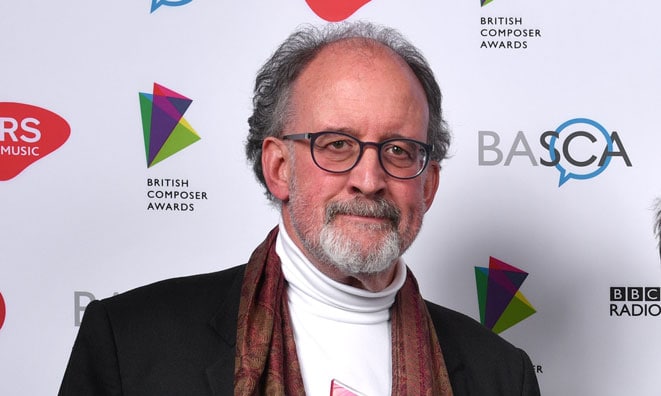With the passing of Simon Bainbridge, the UK has lost one of its most distinguished and influential composers and educators. Born in 1952, Simon studied with John Lambert at the Royal College of Music (1969-72) and Gunther Schuller at Tanglewood, receiving two major commissions whilst still at college: Spirogyra for small ensemble from the Aldeburgh Festival in 1971 and String Quartet No.1 (commissioned by André Previn for the 1972 South Bank Summer Music Festival). These, and other early works, demonstrated a central European sensibility which late morphed into his own unique ‘take’ on American minimalism, most notably in his Concertante in Moto Perpetuo for oboe and ensemble. From this point on, however, his voice became distinctly, and significantly his own. A Viola Concerto for Walter Trampler, Guitar Concerto for David Starobin, Fantasia for Double Orchestra are amongst works that led ultimately to his winning a Grawemeyer Award in 1997 for his Primo Levi based orchestral song cycle Ad Ora Incerta. In 2016, he received an Ivors Academy British Composer Award for Inspiration.
Simon enjoyed a formidable reputation as teacher of composition. He held positions at Edinburgh University, Louisville University, Guildhall School of Music and Drama, Royal College of Music (London), Royal Northern College of Music (Manchester – twice!), taught at the Juilliard School in New York, Boston Conservatory of Music, Yale University and the New England Conservatory of Music and Yonsei University in Seoul, South Korea. From 1999-2007 he was Head of Composition at the Royal Academy of Music (London) and continued as Professor there until ill-health forced him – reluctantly – to step down.
Simon has over 60 works listed in his oeuvre, each one demonstrating his originality and invention through a refined aural sensibility, a sense of adventure, an enviable use of colour and texture, a deep refinement and a true devotion to the craft of composition, the last in particular a commitment he worked hard to impress upon the many composers he taught and mentored.
On a personal note, Simon and I were close friends for over 50 years and we operated as an informal mutual support cell; there are very few works that we didn’t discuss and pore over whilst ‘in progress’ and we went to each other’s concerts and events whenever we could. We visited many countries and cities together, Simon performed best man duties at my wedding, he conducted a massive full evening piece of mine for the Wakefield Festival in 1988. We collaborated in Amsterdam on writing and recording the music for a Mme Tussaud’s permanent exhibition (The Golden Age). Yet none of this even gets close to describing his love of life, his penchant for red wine and Havana cigars, his (and his wife Lynda Richardson’s) hospitality, his humour (often self-deprecating) and the sheer ebullience of his company.
He leaves a hole in our lives but more significantly, a powerful legacy in his music and in the artists and composers whose lives he touched.





